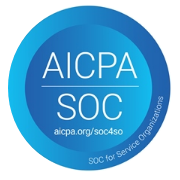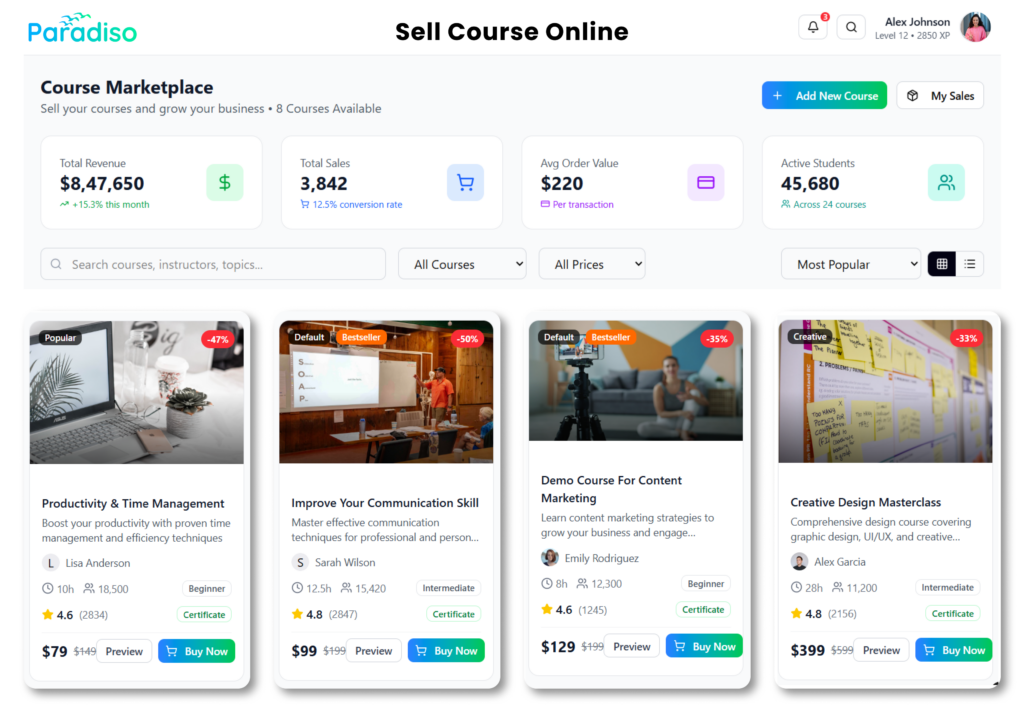What is eCommerce LMS integration?
eCommerce is a term used for buying and selling things online, like when ordering groceries or clothes from websites or apps. In the employee learning and development (L&D) world, eCommerce means using an online payment system to buy courses for employee training or selling courses to people outside the company.
By doing this, companies can make money from their online courses and create a more convenient way for employees to access training materials. It’s a win-win situation that helps everyone grow and learn.
What makes an eCommerce LMS different from a standard LMS?
An LMS (Learning Management System) is great for digital learning, but you need an eCommerce LMS integration to have the best learning experience. This feature lets employees access training and certification programs from the same LMS system they already use.
An eCommerce integration is beneficial for adding external courses, third-party training or certifications, and collecting payments for uniforms or fees. In addition, it makes the employee learning experience seamless and accessible by using a single platform and employee transcript.
Reports have shown that online courses are becoming more valuable for organizations, and companies are switching to eLearning for efficiency benefits. As a result, your LMS should have an excellent user interface, targeted learning, a mobile app, micro-learning features, analytics, and reporting for the best digital workforce offering.
How e-commerce enhances the employee learning experience
Benefits of LMS eCommerce Integration for Employee Training
1. Provide specialized training to employees at a reasonable price
Having eCommerce integration in an LMS expands an organization’s course catalog and promotes cost-sharing for professional development. With this integration, organizations can offer specialized training to teams at a reasonable price using promo codes. L&D leaders can also provide a more extensive course catalog as an additional employee service.
2.Make an easy way for certifications and re-licensing
Integrating eCommerce with an LMS brings many benefits, including a more convenient learning experience for employees. With this integration, employees can purchase courses through the LMS and pay via credit card, completing their training within the system while keeping accurate and up-to-date training records. It ensures that critical employee-paid training is always accessible and includes necessary and updated training. Managers and system administrators also benefit from a seamless user experience, with added courses working with existing data, analytics, and tracking tools.
Helps in making direct payments inside the LMS
An LMS with eCommerce integration offers more than just training and certification. For example, employers can provide employees with various products through a secure shopping cart, such as employee uniforms, branded clothing, event tickets, or sports and fitness memberships. In addition, it eliminates the need for HR leaders and office managers to handle card or cash payments, as payment is made directly inside the LMS.
Benefits of LMS eCommerce Integration for Employers
Are you convinced of the benefits of an advanced LMS with eCommerce integration for employees? Good! But what about the direct benefits for the organization? Here we will discuss some of these advantages:
A. Unified platform for paid and unpaid training programs
If you’re already using an LMS that your employees are familiar with and your team leaders know how to manage, adding third-party digital training without eCommerce integration could result in a disjointed experience. However, integrating eCommerce would enable flawless integration of internal training and paid courses from external vendors, accessible to employees through a single account and login.
B. Eradicate the need to keep records manually.
When all employee training and certification courses are available in one place, there is only one record of all their completed courses. It saves time because there’s no need to search for completed courses on different platforms or make transcripts by hand. In addition, it makes it faster and simpler to keep track of progress, giving more time for both employees and employers to focus on other important work.
C. It gives an advanced learning experience for better retention
eCommerce integration ensures employees get excellent learning experience. It enhances the flexibility and customization of your LMS, making it more adaptable to individual needs. Studies show that employers who prioritize staff development have higher retention rates. An advanced LMS has the potential to fascinate and keep top talent in your organization.
Let’s see how Paradiso eCommerce LMS fulfills your programs specific needs.
The global marketplace is already accepting the shift in the techniques and trends of learning. Add your efforts to sell informative and engaging content through the best e-commerce platform.
1. Easy to Manage Learning & Training content purchases
Paradiso LMS allows you to manage, track, and evaluate learning and training content. Look for an LMS that integrates with your existing systems and will enable you to track and manage content purchases and usage easily.
2. Increased accessibility
An eCommerce LMS allows your employees and customers to access training and learning materials from any device with an internet connection, making it easier for them to learn and access information on the go.
3. Professional Store to sell Courses online
Display your bestselling courses through the Paradiso e-commerce platform, CourseCart, and get interested users driven to purchase your content online.
4. Subscription-based business or Bulk Course sale
Sell courses in bulk to organizations or add subscription plans for your users. Then, offer your users attractive discounts to scale up your business.
5. Third-party payment gateways
Add safe and secure payment gateways for your customers to make online course shopping effective.
Implementing eCommerce LMS Integration into Your Digital Revolution Roadmap for eLearning
By implementing eCommerce in your LMS, you can enhance the learning experience for your team and expand the available resources for training. Including eCommerce in your learning and development transformation roadmap is essential whether you’re seeking better training resources as an LMS user or a leader aiming to improve the learning experience. In addition, Paradiso LMS offers many benefits through eCommerce integration, such as increased course sales and access to a broader range of employee training libraries.














